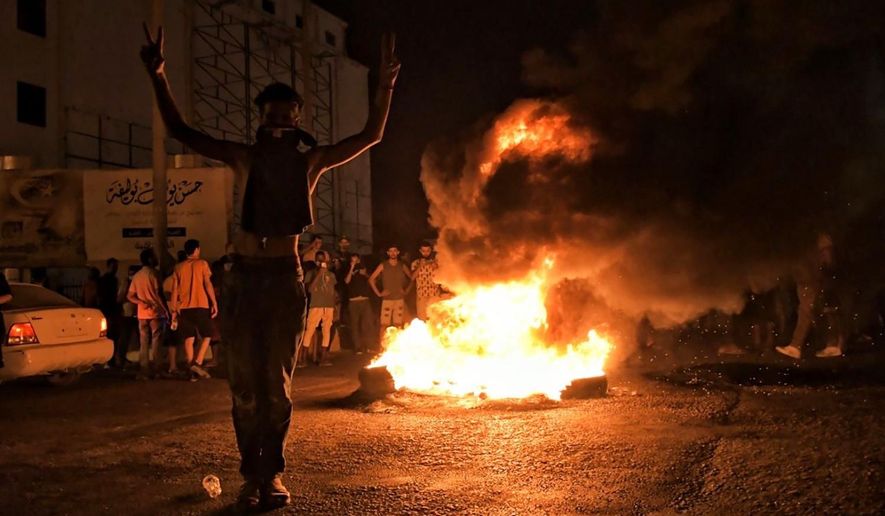DUBAI, United Arab Emirates (AP) - Libya’s east-based parliament convened an emergency meeting Friday to address the eruption of rare protests over dire living conditions across the country’s east, rallies that mirror similar recent protests in the west of the divided nation.
Hundreds of young Libyans first flooded the streets of Benghazi and other eastern cities late Thursday, setting piles of tires ablaze, witnesses said, a spontaneous outburst of anger over the area’s crippling electricity shortages. Late Friday, dozens of young male protesters were seen returning to the streets, blocking traffic at major intersections. Many demonstrators lit fires in the roads, chanting lyrics from popular anthems decrying government corruption.
“We, by God, have been destroyed,” said one protester, Sameh al-Drissi. “We, the young people, have lost 10 years from our lives.”
The demonstrations followed similar protests over power cuts and corruption that have roiled the capital, Tripoli, and other parts of western Libya in recent weeks. Unlike the rallies in the west, however, the protests in Benghazi and elsewhere in the east did not appear centrally organized and were not violently dispersed.
War-torn Libya is split east to west between two administrations, each backed by an array of militias and foreign powers. Military commander Khalifa Hifter rules the east and south, while a U.N.-supported government based in Tripoli controls the west.
In its emergency session Friday, the eastern House of Representatives sought to deflect blame for the deterioration of public services, accusing the Tripoli-based Central Bank and government of “plundering” the country and neglecting the east. In an effort to placate frustrated citizens, it promised to investigate “suspected corruption” and expedite municipal elections.
Yet on both sides of the country, analysts say, internal splits have deepened amid a pause in fighting. Political factions are seeking to co-opt popular fury over the country’s litany of grievances: cash shortages, electricity and water cuts, collapsing infrastructure, rife corruption and a devastating coronavirus outbreak.
“Power brokers are trying to utilize the protests for their own gains and purposes,” said Mohamed Eljarh, co-founder of Libya Outlook, a consultancy based in eastern Libya.
In the west, the U.N.-supported government’s powerful interior minister, Fathi Bashaga, openly backed the protests against his internal rival, Prime Minister Fayez Sarraj - and was briefly dismissed from his post.
In the east, Hifter has faced a series of embarrassing military defeats, with his forces retreating from most of the territories they seized during their failed 14-month campaign to capture Tripoli. This week, Hifter was sidelined from the U.N.-brokered Libyan political talks that took place in Switzerland and Morocco, and is now trying to strengthen his hand against the east-based House of Representatives and its prominent speaker, Aguila Saleh, said Eljarh.
Saleh sent representatives to the talks and has positioned himself as a major Libyan power broker on the world stage, most recently by proposing a cease-fire and a political initiative.
Although Hifter and his forces are known to quash even the mildest dissent, late Thursday, the witnesses in Benghazi said police watched without reacting and even encouraged the protests. Eastern Libya’s interim government and the country’s drastic lack of public services became the focus of outrage - not Hifter.
Libya’s Tripoli-based National Oil Corporation issued a response on Friday to eastern authorities’ allegations that it has failed to provide fuel shipments to the east, where blackouts can exceed 12 hours a day.
The corporation promised it was “making every effort” to deliver fuel to “all parts of Libya and its power plants,” attributing the blackouts and fuel shortages to a months-long blockade of the country’s oil fields imposed by Hifter-allied eastern tribes. Talks to reopen the pipelines have repeatedly broken down. The embargo has cut Libya’s oil production to a trickle, forcing refineries to shut and draining the budget for fuel imports, the corporation said.
An oil tanker carrying 39 million liters of fuel docked in Benghazi’s port on Friday afternoon to resupply power stations, east Libya’s Electricity Authority announced. But without electricity, the vessel would take another full day to unload.
The outbreak of unrest comes after delegates from rival camps, under heavy international pressure, came to a preliminary political agreement in the Swiss city of Montreux, which aims to guide Libya toward elections and demilitarize the contested city of Sirte, controlled by Hifter. Citing the talks in Montreux, as well as political negotiations that continued Friday in Bouznouki, Morocco, the U.S. Embassy in Libya said the “productive consultations” reflect “the deep desire of most Libyans to bring the conflict to an end.”
Before the latest cease-fire took hold, both the Turkish-backed Tripoli government and Hifter’s forces, supported by the United Arab Emirates, Egypt and Russia, were facing off over Sirte, a gateway to Africa’s largest oil reserves.




Please read our comment policy before commenting.